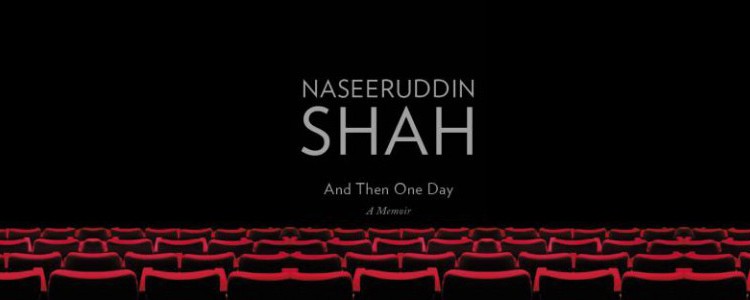Naseeruddin Shah, “And Then One Day”
 “The same year I watched a play for the first time, in the Sem concert hall. It was called Mr Fixit and has faded from my memory almost entirely but while watching it the only thing I wanted was to be up there with those people. When a long limousine, which I later discovered to be plywood cutout on wheels, came gliding on to the stage, I was back in the same universe of wonder where I had watched ‘that man’ dancing on that stage a hundred feet high. And I have since steadfastly believe that the only magic that happens in this world happens on the stage. Films take you captive, they feed you everything on a plate, the legerdemain they create transports you into a state where you may as well be dreaming, but theatre takes you into a world where your imagination is stimulated, your judgement is unimpaired, and thus your enjoyment heightened. It is only in the theatre that there can be this kind of exchange of energies between actor and audience. The finest definition of theatre that I have come across is ‘one actor-one audience’. Implying of course that any meaningful interaction between two people anywhere fits the definition of ideal theatre, with the same qualities needed of both participants as are required from them in an actual theatre. Theatre really is a one-on-one experience.” ( p.13-14)
“The same year I watched a play for the first time, in the Sem concert hall. It was called Mr Fixit and has faded from my memory almost entirely but while watching it the only thing I wanted was to be up there with those people. When a long limousine, which I later discovered to be plywood cutout on wheels, came gliding on to the stage, I was back in the same universe of wonder where I had watched ‘that man’ dancing on that stage a hundred feet high. And I have since steadfastly believe that the only magic that happens in this world happens on the stage. Films take you captive, they feed you everything on a plate, the legerdemain they create transports you into a state where you may as well be dreaming, but theatre takes you into a world where your imagination is stimulated, your judgement is unimpaired, and thus your enjoyment heightened. It is only in the theatre that there can be this kind of exchange of energies between actor and audience. The finest definition of theatre that I have come across is ‘one actor-one audience’. Implying of course that any meaningful interaction between two people anywhere fits the definition of ideal theatre, with the same qualities needed of both participants as are required from them in an actual theatre. Theatre really is a one-on-one experience.” ( p.13-14)
Renowned actor Naseeruddin Shah’s memoir, And Then One Day, is a fabulous example of what a memoir should be –an insight into the personal life of the man/memoirist combined with the vast understanding with their life/passion. A good memoir should not consist entirely of personal details and who said what to whom, where and when; given that it is about an individual who is admired and looked up to for the success they have achieved in their career, a reader wants to know more about the industry/niche the author represents. This is what Naseeruddin Shah does. This is a smartly written memoir which is not a necessarily sugar-coated description of success having come easily to the actor. He attempts to be as realistic in his telling with his love for theatre and films being apparent from childhood.
A life of performance is what he yearns for, knows it is hard work and is willing to do it. For instance after the disastrous workshop of Grotowski held in Poland, that Naseeruddin Shah fled from, made him realise “no one at all could in fact help, and whatever I wanted to learn I’d have to do on my own”. It is a love for films and theatre that seeps through the pages of the memoir, Naseeruddin Shah does not merely rattle off names of films he has seen, plays he has acted in or actors he has hobnobbed with, there is a reason why every person mentioned in the book is present. Whether it is Mr Kendal and his love for staging Shakespeare or Captain Hook in the animated Peter Pan, Spencer Tracy in The Old Man and the Sea, Jose Ferrer in I Accuse!, Peter O’Toole in Becket or appreciating Shammi Kapoor and “Hindi cinema’s certified nutcase Mr Kishore Kumar” and Mehmood, “one of the most skilful actors I’ve ever seen, was not quite up there with Chaplin in terms of ability but much ahead in terms of self-love”. Every description and analysis is filled with a love and understanding of the profession, it is as if being in the world of cinema is like oxygen to Naseeruddin Shah.
Also as a good memoir should be the historical background of newly-independent India, the growth of Bollywood, the emergence of alternative cinema and changing tastes of the audiences is neatly woven through And Then One Day. This is a book which will continue to sell well beyond the immediate buzz of a beloved and admired actor having written his memoirs since it is a rich repository of information about the profession, the literature and theories around it, without being dull.
Of the many, many news stories, reviews, blog posts about the memoir, so far the best interaction has been between Barkha Dutt in conversation with Naseeruddin Shah, NDTV, 14 September 2014 ( Prithvi Theatre, Mumbai) – http://www.ndtv.com/video/player/we-the-people/watch-master-s-take-in-conversation-with-naseeruddin-shah/338122 . As of this week, the publishers, Penguin Books India have collaborated with the Hindustan Times to release a series of short films called “Naseer on Naseer”. The first one was released on 22 September 2014 – http://www.hindustantimes.com/audio-news-video/AV-Entertainment/Naseer-on-Naseer-How-and-why-I-became-an-actor/Article2-1266974.aspx . These short films echo the sentiments of the actor as recorded in his memoir – his love for acting and the stage.
“I wanted more, I could happily have stayed on that stage forever, and in a sense I have. Whether I’d done well or badly was of no consequence. As an imitation of Mr Kendal it wasn’t too far off the mark, but the real revelation for me was the charge of energy I felt that day, and have continued to feel whenever I am onstage. I found myself doing things I hadn’t planned and doing them with complete certainty and to the approval of the audience. It was as if another hand was guiding me. This feeling has stayed with me till today; and therefore, though I am grateful for compliments, I never take full responsibility for either my successes or failures but do try to make sure that they ‘theatre god’ does not turn his back on me. ” (p. 60-1)
Naseeruddin Shah And Then One Day: A Memoir Hamish Hamilton, an imprint of Penguin Books, Gurgaon, India, 2014. Hb. pp. 330 Rs 699



